| Listing 1 - 10 of 13 | << page >> |
Sort by
|
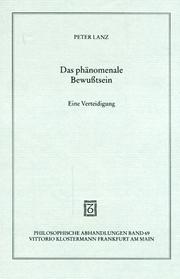
ISBN: 3465028945 Year: 1996 Volume: 69 Publisher: Frankfurt am Main Klostermann
Abstract | Keywords | Export | Availability | Bookmark
 Loading...
Loading...Choose an application
- Reference Manager
- EndNote
- RefWorks (Direct export to RefWorks)
Perceptie (Filosofie) --- Perception (Philosophie) --- Perception (Philosophy) --- Waarneming (Filosofie) --- Phenomenalism --- Sense (Philosophy) --- Philosophy --- Senses and sensation --- Knowledge, Theory of --- Positivism --- Reality
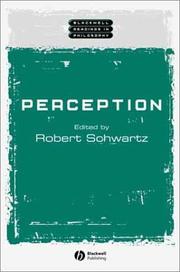
ISBN: 063122422X 0631224211 Year: 2004 Volume: 12 Publisher: Malden, MA : Blackwell Publishing,
Abstract | Keywords | Export | Availability | Bookmark
 Loading...
Loading...Choose an application
- Reference Manager
- EndNote
- RefWorks (Direct export to RefWorks)
Philosophical anthropology --- Affective and dynamic functions --- Perceptie (Filosofie) --- Perception (Philosophie) --- Perception (Philosophy) --- Waarneming (Filosofie) --- #PBIB:2005.3 --- Philosophy --- Perception --- Vision --- Perception (philosophie)
Book
ISBN: 2271062519 9782271062512 Year: 2004 Volume: *3 Publisher: Paris : CNRS éditions,
Abstract | Keywords | Export | Availability | Bookmark
 Loading...
Loading...Choose an application
- Reference Manager
- EndNote
- RefWorks (Direct export to RefWorks)
Theory of knowledge --- Affective and dynamic functions --- Beeld (Filosofie) --- Image (Philosophie) --- Image (Philosophy) --- Perceptie (Filosofie) --- Perception (Philosophie) --- Perception (Philosophy) --- Reality --- Réalité --- Waarneming (Filosofie) --- Werkelijkheid --- Reality. --- Réalité --- Philosophy. --- Philosophy --- Truth --- Nominalism --- Pluralism --- Pragmatism --- Perception (philosophie). --- Couleur (philosophie). --- Philosophie.
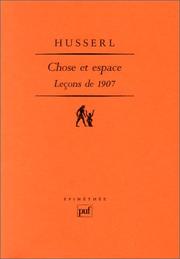
ISBN: 2130424775 9782130424772 Year: 1989 Volume: vol *40 Publisher: Paris : Presses universitaires de France,
Abstract | Keywords | Export | Availability | Bookmark
 Loading...
Loading...Choose an application
- Reference Manager
- EndNote
- RefWorks (Direct export to RefWorks)
Theory of knowledge --- Espace--Perception --- Fenomenologie --- Object (Filosofie) --- Object (Philosophy) --- Objet (Philosophie) --- Perceptie (Filosofie) --- Perception (Philosophie) --- Perception (Philosophy) --- Perception spatiale --- Phenomenology --- Phénoménologie --- Ruimteperceptie --- Ruimtewaarneming --- Space perception --- Spatial perception --- Waarneming (Filosofie) --- Perception --- Phénoménologie --- Phénoménologie. --- Perception (philosophie).
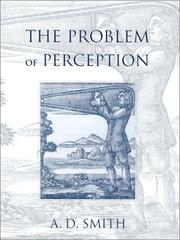
ISBN: 0674008413 Year: 2002 Publisher: Harvard University Press
Abstract | Keywords | Export | Availability | Bookmark
 Loading...
Loading...Choose an application
- Reference Manager
- EndNote
- RefWorks (Direct export to RefWorks)
Perceptie (Filosofie) --- Perception (Philosophie) --- Perception (Philosophy) --- Realism --- Realisme --- Realisme (Filosofie) --- Réalisme --- Réalisme (Philosophie) --- Waarneming (Filosofie) --- Realism. --- Empiricism --- Philosophy --- Universals (Philosophy) --- Conceptualism --- Dualism --- Idealism --- Materialism --- Nominalism --- Positivism --- Rationalism --- Réalisme
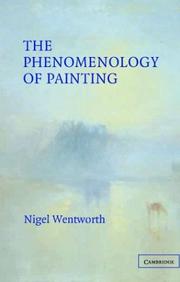
ISBN: 0521819997 Year: 2004 Publisher: Cambridge New York Port Melbourne Cambridge University Press
Abstract | Keywords | Export | Availability | Bookmark
 Loading...
Loading...Choose an application
- Reference Manager
- EndNote
- RefWorks (Direct export to RefWorks)
Creatie (Literaire, artistieke, enz.) --- Creation (Literary, artistic, etc.) --- Creative ability in art --- Création (esthétique) --- Création artistique --- Création littéraire, artistique, etc. --- Perceptie (Filosofie) --- Perception (Philosophie) --- Perception (Philosophy) --- Schepping (Literaire, artistieke, enz.) --- Waarneming (Filosofie) --- Painting --- Philosophy --- Psychological aspects
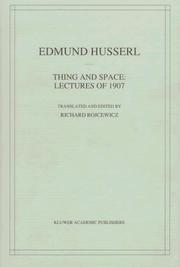
ISBN: 0792347498 9780792347491 Year: 1997 Volume: 7 Publisher: Dordrecht ; Norwell, MA : Kluwer,
Abstract | Keywords | Export | Availability | Bookmark
 Loading...
Loading...Choose an application
- Reference Manager
- EndNote
- RefWorks (Direct export to RefWorks)
This is a translation of Edmund HusserI's lecture course from the Summer semester 1907 at the University of Gottingen. The German original was pub lished posthumously in 1973 as Volume XVI of Husserliana, Husserl's opera omnia. The translation is complete, including both the main text and the supplementary texts (as Husserliana volumes are usually organized), except for the critical apparatus which provides variant readings. The announced title of the lecture course was "Main parts of the phenome nology and critique of reason." The course began with five, relatively inde pendent, introductory lectures. These were published on their own in 1947, bearing the title The idea ojphenomenology.l The "Five Lectures" comprise a general orientation by proposing the method to be employed in the subsequent working out of the actual problems (viz., the method of "phenomenological reduction") and by clarifying, at least provisionally, some technical terms that will be used in the labor the subsequent lectures will carry out. The present volume, then, presents that labor, i.e., the method in action and the results attained. As such, this text dispels the abstract impression which could not help but cling to the first five lectures taken in isolation. Accord ingly, we are here given genuine "introductory lectures," i.e., an introduction to phenomenology in the genuine phenomenological sense of engaging in the work of phenomenology, going to the "matters at issue themselves," rather than remaining aloof from them in abstract considerations of standpoint and approach.
Theory of knowledge --- Espace et temps --- Fenomenologie --- Mind --- Object (Filosofie) --- Object (Philosophy) --- Objet (Philosophie) --- Perceptie (Filosofie) --- Perception (Philosophie) --- Perception (Philosophy) --- Phenomenology --- Phénoménologie --- Raison --- Rationaliteit --- Rationality --- Rationalité --- Reason --- Rede --- Ruimte en tijd --- Space and time --- Space of more than three dimensions --- Space-time --- Space-time continuum --- Space-times --- Spacetime --- Temps et espace --- Tijd en ruimte --- Time and space --- Waarneming (Filosofie) --- Phenomenology. --- Reason. --- Space and time. --- Fourth dimension --- Infinite --- Metaphysics --- Philosophy --- Space sciences --- Time --- Beginning --- Hyperspace --- Relativity (Physics) --- Intellect --- Rationalism --- Philosophy, Modern --- Object (Philosophy). --- Perception (Philosophy). --- Phénoménologie
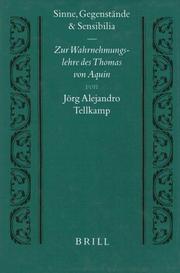
ISSN: 01698125 ISBN: 9004114106 9004452834 9789004114104 9789004452831 Year: 1999 Volume: 66 Publisher: Leiden; Boston : BRILL
Abstract | Keywords | Export | Availability | Bookmark
 Loading...
Loading...Choose an application
- Reference Manager
- EndNote
- RefWorks (Direct export to RefWorks)
Thomas Aquinas' theory of knowledge has mainly been studied from the point of view of his theory of intellect. However, one of the constituent elements of such a theory has been widely neglected: perception. This work tries to disentangle the different aspects of Aquinas' theory. First, the causes of perception are looked at, including analyses on the physics of perception. Secondly, the psychology of perceptual knowledge and the theory of sensibles are explored, and thirdly, the importance of the perceptual apparatus is sketched by stressing the role of the outer and inner senses in the process of the acquisition of perceptual knowledge. In order to give a comprehensive account of his theory, three main aspects are taken into account.
Perceptie (Filosofie) --- Perception (Philosophie) --- Perception (Philosophy) --- Waarneming (Filosofie) --- Thomas, --- Contributions in philosophy of perception. --- 1 THOMAS AQUINAS --- Philosophy --- Filosofie. Psychologie--THOMAS AQUINAS --- Thomas Aquinas, Saint --- -Contributions in philosophical theology --- 1 THOMAS AQUINAS Filosofie. Psychologie--THOMAS AQUINAS --- Perception (Philosophy). --- Akʻvineli, Tʻoma, --- Akvinietis, Tomas, --- Akvinskiĭ, Foma, --- Aquinas, --- Aquinas, Thomas, --- Foma, --- Thomas Aquinas, --- Tʻoma, --- Toma, --- Tomas, --- Tomasu, --- Tomasu, Akwinasu, --- Tomasz, --- Tommaso, --- Tʻovma, --- Тома, Аквінський, --- תומאס, --- תומס, --- اكويني ، توما --- Thomas Aquinas --- Contributions in philosophy of perception --- Ākvīnās, Tūmās, --- اكويني، توما, --- آکويناس، توماس, --- Christian philosophers
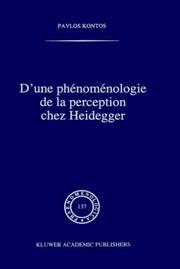
ISBN: 079233776X 9780792337768 Year: 1996 Volume: 137 Publisher: Dordrecht ; Norwell, MA : Kluwer,
Abstract | Keywords | Export | Availability | Bookmark
 Loading...
Loading...Choose an application
- Reference Manager
- EndNote
- RefWorks (Direct export to RefWorks)
Ce travail ambitionne inaugurer la thématisation d'une phénoménologie de la perception chez Heidegger. En prenant le contre-pied de bien des interprétations récentes concernant de questions cruciales de l'ontologie heideggerienne, notamment celles de l'articulation temporelle du présent et de la distinction entre Zuhandenheit et Vorhandenheit, il défend la thèse inattendue que la temporalité de la perception sert de fil conducteur de l'ontologie heideggerienne du temps, dans la mesure où elle impose la scission de la temporalité en modes authentiques et modes inauthentiques.Notre commentaire serré sur les textes de l'époque de Marbourg fera apparaître que l'opposition entre la temporalité authentique de la perception `naturelle', identifiée positivement à la circonspection, et la temporalité inauthentique de la perception `théorique' ne résume pas simplement la critique heideggerienne de Husserl, mais contribue, avant tout, à ouvrir un espace critique dans la problématique phénoménologique de la perception dans son évolution de Husserl jusqu'à Merleau-Ponty.
Philosophical anthropology --- Theory of knowledge --- Heidegger, Martin --- Perceptie (Filosofie) --- Perception (Philosophie) --- Perception (Philosophy) --- Waarneming (Filosofie) --- Philosophy, German --- Phenomenology --- Ontology --- Time perception --- Time --- Philosophie allemande --- Phénoménologie --- Ontologie --- Perception du temps --- Temps (Philosophie) --- Philosophy --- Philosophie --- Heidegger, Martin, --- Criticism and interpretation --- Critique et interprétation --- 1 HEIDEGGER, MARTIN --- Academic collection --- Filosofie. Psychologie--HEIDEGGER, MARTIN --- -Contributions in philosophy of animals --- 1 HEIDEGGER, MARTIN Filosofie. Psychologie--HEIDEGGER, MARTIN --- Perception (Philosophy). --- Phénoménologie --- Critique et interprétation --- Contributions in philosophy of perception --- Criticism and interpretation. --- Khaĭdegger, Martin, --- Haĭdegger, Martin, --- Hīdajar, Mārtin, --- Hai-te-ko, --- Haidegŏ, --- Chaitenger, Martinos, --- Chaitenker, Martinos, --- Chaintenger, Martin, --- Khaĭdeger, Martin, --- Hai-te-ko-erh, --- Haideger, Marṭinn, --- Heidegger, M. --- Haideger, Martin, --- Hajdeger, Martin, --- הייגדר, מרתין --- היידגר, מרטין --- היידגר, מרטין, --- 海德格尔, --- Chaintenker, Martin, --- Hāydigir, Mārtīn, --- Hīdigir, Mārtīn, --- هاىدگر, مارتين, --- هىدگر, مارتين, --- Heidegger (martin), philosophe allemand, 1889-1976 --- Critique et interpretation
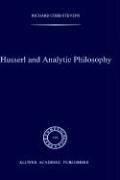
ISBN: 0792304675 9401073422 9400918887 9780792304678 Year: 1990 Volume: 116 Publisher: Dordrecht ; Boston, MA ; London : Kluwer,
Abstract | Keywords | Export | Availability | Bookmark
 Loading...
Loading...Choose an application
- Reference Manager
- EndNote
- RefWorks (Direct export to RefWorks)
The principal differences between the contemporary philosophic traditions which have come to be known loosely as analytic philosophy and phenomenology are all related to the central issue of the interplay between predication and perception. Frege's critique of psychologism has led to the conviction within the analytic tradition that philosophy may best defend rationality from relativism by detaching logic and semantics from all dependence on subjective intuitions. On this interpretation, logical analysis must account for the relationship of sense to reference without having recourse to a description of how we identify particulars through their perceived features. Husserl' s emphasis on the priority and objective import of perception, and on the continuity between predicative articulations and perceptual discriminations, has yielded the conviction within the phenomenological tradition that logical analysis should always be comple mented by description of pre-predicative intuitions. These methodological differences are related to broader differences in the philosophic projects of analysis and phenomenology. The two traditions have adopted markedly divergent positions in reaction to the critique of ancient and medieval philosophy initiated by Bacon, Descartes, and Hobbes at the beginning of the modern era. The analytic approach generally endorses the modern preference for calculative rationality and remains suspicious of pre-modern categories, such as formal causality and eidetic intuition. Its goal is to give an account of human intelligence that is compatible with the modern interpretation of nature as an ensemble of quantifiable entities and relations.
Philosophy of language --- Theory of knowledge --- Husserl, Edmund --- Analyse (Filosofie) --- Analyse (Philosophie) --- Analyse linguistique (Philosophie) --- Analysis (Philosophy) --- Analysis [Linguistic ] (Philosophy) --- Analysis [Logical ] --- Analysis [Philosophical ] --- Analytical philosophy --- Analytische filosofie --- Fenomenologie --- Filosofische taalanalyse --- Intuitie --- Intuition --- Linguistic analysis (Filosofie) --- Linguistic analysis (Philosophy) --- Logical analysis --- Perceptie --- Perceptie (Filosofie) --- Perception --- Perception (Philosophie) --- Perception (Philosophy) --- Phenomenology --- Philosophical analysis --- Philosophie analytique --- Philosophy [Analytical ] --- Phénoménologie --- Psychologism --- Psychologisme --- Waarneming --- Waarneming (Filosofie) --- Husserl, Edmund, --- Phenomenology. --- Psychologism. --- Perception. --- Intuition. --- 1 HUSSERL, EDMUND --- Academic collection --- #GROL:SEMI-1-05'19' Huss --- Phenomenological psychology --- Philosophy, Modern --- Supraliminal perception --- Cognition --- Apperception --- Senses and sensation --- Thought and thinking --- Intuition (Psychology) --- Intuitionalism --- Insight --- Analysis, Linguistic (Philosophy) --- Analysis, Logical --- Analysis, Philosophical --- Analytic philosophy --- Philosophy, Analytical --- Language and languages --- Methodology --- Philosophy --- Logical positivism --- Semantics (Philosophy) --- Filosofie. Psychologie--HUSSERL, EDMUND --- 1 HUSSERL, EDMUND Filosofie. Psychologie--HUSSERL, EDMUND --- Analysis (Philosophy). --- Phénoménologie --- Husserl, Edmond --- Husserl (edmund), philosophe allemand, 1859-1938 --- Critique et interpretation --- Philosophie analytique.
| Listing 1 - 10 of 13 | << page >> |
Sort by
|

 Search
Search Feedback
Feedback About UniCat
About UniCat  Help
Help News
News